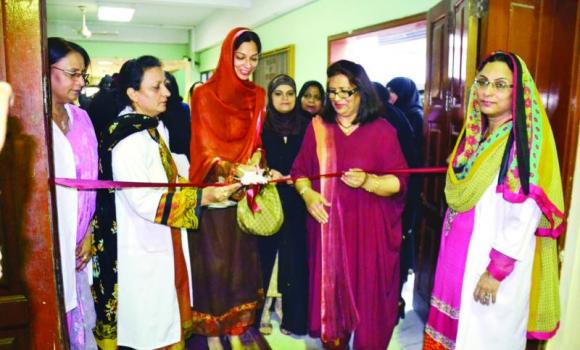
Jeddah, Dec 30: The Pakistan Welfare Society (PWS) organized a women’s health awareness program on Saturday with the aim of enlightening the people about health issues.
The program comprised a panel of four female doctors — Dr. Rabia Khatoon, family consultant at King Fahd Hospital; Dr. Nilofar Azra, gynecologist and obstetrician; Dr. Farzana Iqbal, gynecologist and obstetrician at King Faisal Hospital; and Dr. Samreen Safdar, diabetes and endocrine consultant at King Faisal Hospital.
A number of other doctors and assistants conducted free medical check-ups and gave advice to the attendees on body mass index, weight, blood sugar and regular exercise.
The program started with the recitation of the Holy Qur'an followed by a welcome speech by chief guest Afshan Khokher, wife of the Pakistan consul general.
Imrana Siddiqui, wife of deputy consul general; Farhat Naeem, vice principal of Pakistan International School-Jeddah (PISJ-Aziziah), and members of the community attended the event.
Riffat Arshad explained the importance of health and regular check-ups, activities of PWS, which include free medical camps, school health services and scholarships for needy students, raising awareness through health seminars and the kidney transplant center near Abbotabad.
Khatoon talked about common female cancers such as breast, uterus and cervical, their symptoms and the importance of timely check-up and treatment.
She explained that breast cancer is very common in women and the risk factors increase after the age of 50. “Early diagnosis is the key to survival, and there is a need to create awareness of screening and mammogram,” she said, and explained different factors of breast cancer as faulty genes, heredity, not doing breast feeding, late menopause, having children in late age and others.
She also explained that cervical cancer is the third most common cancer among women which can be easily prevented through regular check-ups of pap smear screening and HPV vaccination.
Azra explained anemia in pregnant women, diabetes or high sugar during pregnancy and importance of regular check-ups.
Iqbal explained the myth and misconceptions about vaginal discharge, the most common problem of almost all women of all ages.
Safdar spoke on diabetes and its problems, the importance of healthy and balanced food, and daily exercise as medicine alone is not enough to take care of the disease.
Khokher thanked all the doctors for the important information and assured them of the support of the consulate for welfare work of the community.





Comments
Add new comment